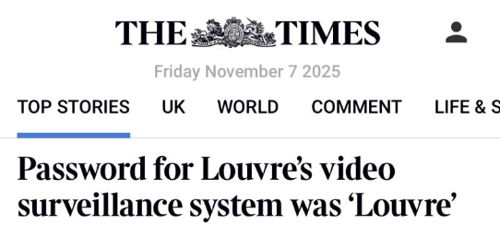
Password for Louvre Video Surveillance System Was “Louvre” — Cybersecurity Failures Under Scrutiny After $102M Heist.
14/11/2025

Paris, November 14, 2025 - The Louvre Museum, the world’s most visited cultural landmark, is facing intense criticism after investigators revealed that its internal video surveillance system was protected by the password “Louvre.” This disclosure follows the audacious October 19 daylight heist in which thieves stole eight pieces of French Crown Jewels valued at approximately $102 million from the Apollo Gallery.
French authorities confirmed during Senate hearings that the simplistic password was active at the time of the robbery. A confidential audit by France’s National Cybersecurity Agency (ANSSI) had flagged this vulnerability as early as 2014, warning that weak password practices and obsolete systems posed “serious shortcomings” in the museum’s security infrastructure. Despite repeated alerts, modernisation efforts were delayed until 2024 and remain incomplete, with full upgrades not expected until 2032. [ftnnews.com], [abcnews.go.com], [independent.co.uk]
The heist, executed in under eight minutes by four suspects disguised as construction workers, exploited blind spots in camera coverage and outdated digital protocols. While alarms triggered correctly, investigators say attackers may have accessed control panels remotely due to the absence of multi-factor authentication.
Four suspects have been charged, but the jewels remain missing. [abcnews.go.com], [techspot.com]
Official Response:
Culture Minister Rachida Dati acknowledged “major flaws” in external protection and announced immediate measures, including anti-intrusion barriers and a new cybersecurity governance framework. Louvre Director Laurence des Cars admitted being “appalled” by the museum’s security posture upon taking office in 2021. [abcnews.go.com], [ndtv.com]
Global Impact:
The incident has sparked a broader debate on digital security in cultural institutions worldwide. Tech firms, including Proton, have pledged to provide free password management tools to museums, underscoring the urgency of robust cyber defences. [techradar.com]
Cybersecurity Analysis: Lessons Learned
The Louvre breach is a textbook case of cyber-physical risk convergence. Key lessons:
- Weak Passwords Undermine Strong Systems
Even advanced surveillance hardware cannot compensate for poor credential hygiene. Using an institution’s name as a password signals systemic governance failure. [crowell.com] - Credential Management Is a Governance Issue
Password policies are not just IT tasks—they reflect organisational culture and risk appetite. Institutions must enforce complexity standards and periodic rotation. - Cybersecurity and Physical Security Are Intertwined
Digital vulnerabilities can amplify physical intrusions. In this case, inadequate access controls and blind spots delayed response, enabling an eight-minute theft. [linkedin.com] - Underinvestment Carries Regulatory and Liability Risks
Delayed upgrades and ignored audits expose institutions to reputational damage and potential legal consequences. Regulators increasingly view MFA and encryption as baseline requirements. [crowell.com] - Adopt Modern Controls
- Multi-Factor Authentication (MFA) for all remote access.
- Password Managers for complex, unique credentials.
- Continuous Monitoring and Patch Management for legacy systems.
- Cybersecurity Training for staff to prevent human-factor failures.
Bottom Line: The Louvre incident is not an isolated lapse—it reflects a global trend of cultural institutions lagging in digital modernisation. Cybersecurity must be treated as an integral part of heritage preservation.
Sources:
- https://www.linkedin.com/pulse/case-study-cybersecurity-failures-behind-2025-louvre-heist-ktlde/
- ABC News [abcnews.go.com] https://abcnews.go.com/International/password-louvres-video-surveillance-system-louvre-employee/story?id=127236297
- The Independent [independent.co.uk] https://www.independent.co.uk/news/world/europe/louvre-security-password-museum-heist-burglary-b2859831.html
- Fox News [foxnews.com] https://www.foxnews.com/tech/thieves-steal-100m-jewels-from-louvre-after-museum-used-own-name-surveillance-password
- TechRadar [techradar.com] https://www.techradar.com/computing/cyber-security/in-the-wake-of-the-louvre-heist-proton-steps-in-to-offer-free-password-protection
- Crowell & Moring Analysis [crowell.com] https://www.crowell.com/en/insights/client-alerts/the-password-is-louvre-lessons-for-everyone-from-the-louvres-jewel-heist
The Team
Meet the team of industry experts behind Comsure
Find out moreLatest News
Keep up to date with the very latest news from Comsure
Find out moreGallery
View our latest imagery from our news and work
Find out moreContact
Think we can help you and your business? Chat to us today
Get In TouchNews Disclaimer
As well as owning and publishing Comsure's copyrighted works, Comsure wishes to use the copyright-protected works of others. To do so, Comsure is applying for exemptions in the UK copyright law. There are certain very specific situations where Comsure is permitted to do so without seeking permission from the owner. These exemptions are in the copyright sections of the Copyright, Designs and Patents Act 1988 (as amended)[www.gov.UK/government/publications/copyright-acts-and-related-laws]. Many situations allow for Comsure to apply for exemptions. These include 1] Non-commercial research and private study, 2] Criticism, review and reporting of current events, 3] the copying of works in any medium as long as the use is to illustrate a point. 4] no posting is for commercial purposes [payment]. (for a full list of exemptions, please read here www.gov.uk/guidance/exceptions-to-copyright]. Concerning the exceptions, Comsure will acknowledge the work of the source author by providing a link to the source material. Comsure claims no ownership of non-Comsure content. The non-Comsure articles posted on the Comsure website are deemed important, relevant, and newsworthy to a Comsure audience (e.g. regulated financial services and professional firms [DNFSBs]). Comsure does not wish to take any credit for the publication, and the publication can be read in full in its original form if you click the articles link that always accompanies the news item. Also, Comsure does not seek any payment for highlighting these important articles. If you want any article removed, Comsure will automatically do so on a reasonable request if you email info@comsuregroup.com.


